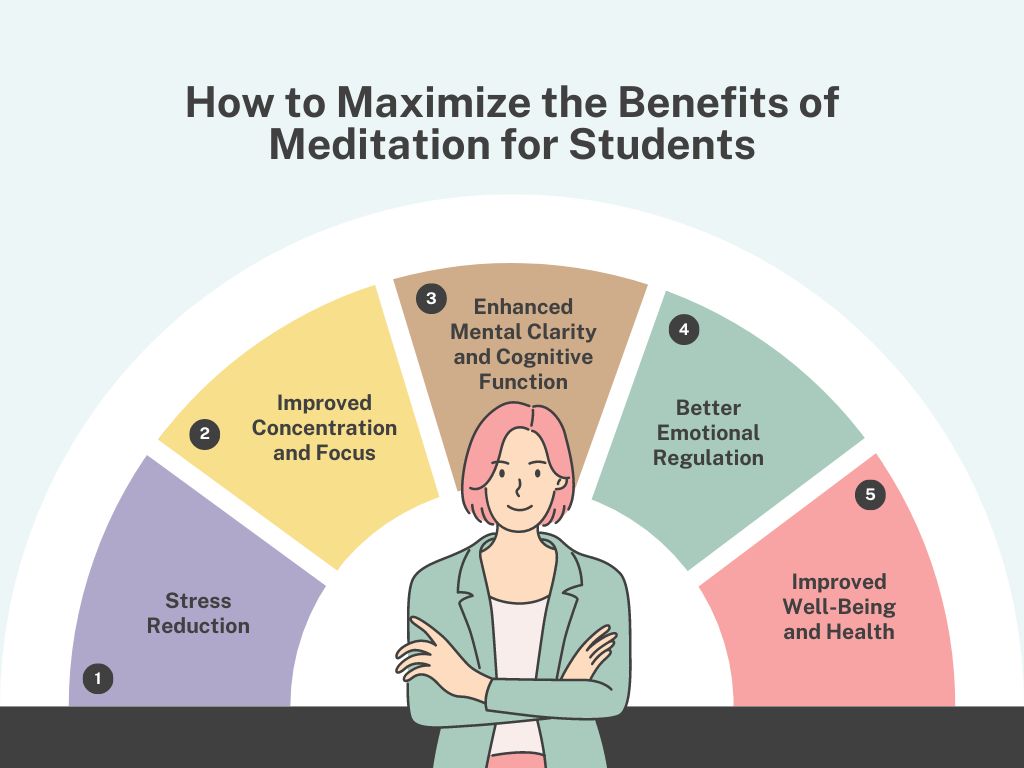Students encounter an ever-growing range of difficulties in today’s fast-paced and stressful academic environment, from academic expectations to social and emotional stresses.
Meditation has become a potent and practical technique that may improve the student experience amidst this deluge of expectations. There are many benefits of meditation for students examined in this article, emphasising how this age-old practice may improve their mental, emotional, and physical health.
In the middle of the chaos, meditation provides students with a haven of peace by enhancing their capacity for concentration, attention, and information absorption, which eventually results in improved academic achievement.
They gain essential stress-management skills as a result, which helps to lessen the negative impacts of worry and burnout outside of the classroom.
Additionally, the exercise promotes self-awareness, emotional intelligence, and empathy. Students who practice meditation report having more resiliency and self-confidence, which helps them deal with obstacles both within and outside of school.
“Additionally, meditation enhances physical well-being by lowering the risk of a variety of illnesses and boosting general vigour. It encourages behaviours that last long after graduation by empowering students to live healthier lifestyles.”

The Benefits of meditation for students will be covered in-depth in the following article, along with insights and helpful advice to assist students in incorporating meditation into their everyday routines.
Discovering the transforming potential of meditation, we show students how to achieve academic achievement, emotional harmony, and overall well-being.
1. Stress Reduction
The benefits of meditation for students are numerous and important for their general well-being, especially in the context of stress reduction. The many obstacles that students face while pursuing their academic goals can be overcome with the use of meditation.
- The capacity of meditation to give students a haven of tranquillity in the middle of the sometimes overwhelming demands of schoolwork and examinations makes the benefits of meditation for stress reduction clear.
- The routine helps pupils develop a sense of inner peace and tranquillity, enabling them to handle stressful circumstances with more composure.
The benefits of meditation for students also include reducing the negative impacts of ongoing stress. Students can learn to observe their thoughts and emotions objectively by practising mindfulness meditation.
They are better able to pinpoint the causes of stress and anxiety in their life because of their increased self-awareness. With this knowledge, students can deal with these problems more successfully, which will lower their stress levels.
The development of critical abilities for handling the demands of academic life is included in the benefits of meditation for students in stress reduction.
These advantages promote emotional equilibrium, enabling students to retain their mental and emotional health and, as a result, to have a more fruitful and satisfying educational experience.
Through regular practice, students may maximize both their academic performance and general quality of life by utilizing the transformational power of meditation.
2. Improved Concentration and Focus
The considerable improvement in attention and focus is one of the primary benefits of meditation for students. In the hectic academic setting, paying continuous attention is crucial for learning material, finishing tasks, and performing well on tests.
Students have access to a potent technique in meditation that can improve their cognitive functioning and, in consequence, their academic achievement.
“There are multiple benefits of meditation for students in terms of attention. Students can develop a higher level of awareness via regular meditation practice. Allowing them to be completely present and involved in their academics. “
They are better able to reduce distractions, repress the temptation to multitask, and retain more information because of this increased awareness. Additionally, meditation can assist students in building mental fortitude. It needed to stay on track even when confronted with difficult or laborious work.
The benefits of meditation for students in terms of enhanced attention are particularly relevant in a world full of digital distractions and information overload. In addition to improving academic achievement, this talent gives pupils priceless life skills that they may use in many other aspects of their future endeavours.
3. Enhanced Mental Clarity and Cognitive Function
This highlights the major benefits of meditation for students in terms of improving mental clarity and cognitive performance. When incorporated into a student’s daily practice, meditation offers several cognitive benefits.
It could improve one’s capacity for memory retention, problem-solving, and judgment. These advantages are especially beneficial to students as they balance the demands of their academic education and other obligations.
- Meditation can help pupils process information more efficiently by sharpening their mental faculties. They can tackle complicated subjects with greater ease and confidence because of their improved mental clarity.
- Furthermore, as meditation fosters serenity and concentration, students are better able to participate in their studies, guaranteeing that they can focus more efficiently on their assignments.
Essentially, the benefits of meditation for students in terms of enhanced cognitive function may have a significant influence on their academic performance, as they are better able to take in, process, and remember knowledge, eventually resulting in their success in their scholastic endeavours.

4. Better Emotional Regulation
The benefits of meditation for students also include better emotional control, and providing a crucial support network throughout their academic path.
An improved capacity to comprehend, analyze, and successfully control emotions is one of the benefits of meditation for students. Students can increase their sense of self-awareness via mindfulness exercises, enabling them to spot and handle emotional difficulties as they appear.
Students who meditate are better able to handle the ups and downs of academic life while also feeling less stressed, anxious, and overwhelmed. Through greater mental health and increased emotional resilience, overall academic performance and personal development are significantly impacted.
Interpersonal interactions are an additional benefit of meditation for students. Students who are skilled at controlling their own emotions can interact with peers, instructors, and mentors in ways that improve communication and conflict resolution.
In the end, these emotional advantages of meditation support both academic performance and personal growth. By generating a more balanced and enjoyable student experience.
5. Improved Well-Being and Health – One of the benefits of meditation for students
The benefits of meditation for students go beyond only improving academic achievement; they also include the student’s overall well-being. Numerous physical and psychological benefits of regular meditation can contribute to a better and happier student life.
Improving mental health is one of the main “benefits of meditation for students.” It helps in lowering anxiety and despair, two problems that students frequently experience. Meditation helps students better handle the pressures of their academic path by encouraging emotional stability and inner peace.
“The “benefits of meditation for students” also include improved physical health. The student’s general health can be improved by lessening stress, which can also decrease blood pressure and enhance the immune system.”
Another benefit is better sleep habits, which are crucial for students’ physical and mental health.
In conclusion, the “benefits of meditation for students” include stress reduction, increased sleep, physical well-being, and mental and emotional health. These factors work together to build an atmosphere that is supportive of both academic performance and personal development.
6. For calmness
Students’ mental health depends on meditation since it keeps their thoughts calm. People who meditate everyday report being able to concentrate better at work or in their academics. For this reason, individuals’ mental and physical wellness benefits from meditating daily.
Schools might be stressful and gloomy at times, however, if you meditate first, you’ll feel calmer and more at ease when you study.
As is well known, students can benefit from meditation. They occasionally find it extremely difficult and stressful to maintain strong academic performance, which pushes them to take on additional stress.
By including meditation in your routine, you can reduce tension and anxiety while practising mindfulness and finding calm. You will have a profoundly relaxed and stress-free state while meditating.
7. Better sleep and depression
A healthy sleep schedule is crucial for the correct operation of our body as well as the brain. Regular meditation practice helps students calm their bodies and brains, which is necessary to get enough good sleep without being disturbed.
- As a result, students who practice meditation daily or often get healthy sleep. Insufficient sleep has been linked to several illnesses and health problems.
- One serious issue that has been observed, particularly in youngsters, is depression. Depression can be effectively managed by meditation. As everyone knows, depression has a serious negative impact on one’s mental health.
Mindfulness meditation, which can help people feel less depressed, should be practised for at least 10-15 to 20 minutes each day.
8. Build confidence and memorize the data
Students who regularly meditate improve their ability to solve problems. Retention of data and cognitive abilities are generally enhanced and improved by meditation.
Frequent meditation teaches pupils important skills and helps them become more confident. It strengthens your mental and emotional fortitude. Students gain the bravery to make announcements and speak in front of others.
Read Also:-
Conclusion
In conclusion, students can gain a wide range of priceless advantages from meditation. It gives students practical life skills that they can use outside of the classroom, encouraging emotional resilience, better attention, and a greater sense of self-awareness.
“Students can improve their mental health by using mindfulness techniques. To better handle the stress and anxiety that frequently comes on from the strains of academic life.”
Additionally, meditation supports cognitive processes by improving recall, problem-solving skills, and creative thinking. It promotes improved time management and productivity by fostering a good work-life balance.
The benefits of meditation also extend to social interactions, where they foster empathy and interpersonal bonds.
- Meditation is a potent technique to create the self-control required for successful academic endeavours and personal development in a world where distractions are everywhere.
- From meditation, students have various benefits.
Students may reach their greatest potential by incorporating meditation into their daily schedules, maintaining a harmonic balance between academic success and overall well-being. A transforming road to intellectual and personal achievement is provided by this practice.
FAQs on benefits of meditation for students
Better concentration and stress reduction.
Reduces distractions and increases attention.
Yes, it encourages relaxation.
Reduces the signs and symptoms of anxiety and sadness.
No, brief sessions are beneficial.
Improves memory and brain plasticity, is the response.
Yes, it promotes prioritization and decreases procrastination.
reduces stress and blood pressure.
Yes, it improves communication and empathetic behaviour.
Generally speaking, yes, for all pupils










